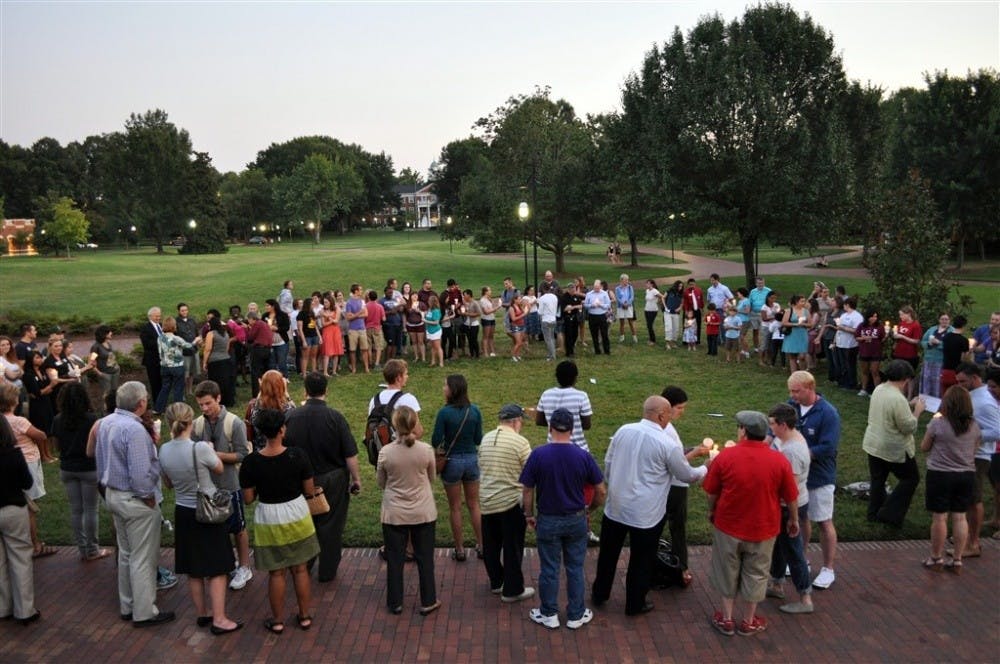The North Carolina state legislature is currently debating an amendment to the state constitution that would define marriage between a man and a woman as the only legally recognized relationship. While same-sex marriage is not currently legal in North Carolina, supporters of LGBTQ rights are outraged by what many are calling "legalized discrimination."
The bill went up for debate Monday, Sept. 12 and passed the House. If the Senate passes the bill as well, the amendment will go on a ballot in an upcoming election and will be signed into law if a simple majority votes yes.
A vigil organized by Kirstin Ringelberg, associate professor of art history and coordinator of the LGBTQ office at Elon University, was held in front of Moseley Center Monday evening. More than 100 students, faculty, staff and family members were present at the event, including President Leo Lambert and Smith Jackson, vice president and dean of Student Life.
Ringelberg began the vigil with an explanation of the bill and several students, faculty and staff spoke out with their own stories of support for the LGBTQ community.
"We're here tonight not just to protest this discriminatory amendment but to show that we are here, many of us are queer, we have proud straight allies and none of us are going to shut up or go away to make other people comfortable," Ringelberg said. "That's a pretty powerful thing, that we're all here together to fight for our right to be treated like individuals."
While marriage rights will not be changed, the amendment would revoke the ability for public and private entities to offer domestic partner benefits. Elon is one of many private institutions that offers such benefits and while the ability to do so would not be automatically challenged by the state, Ringelberg said, the government would no longer protect these rights.
"There are a lot of business owners throughout the state who are concerned this would affect business negatively," she said. "A lot of people would work to find a way to make those kinds of benefits work, but rights certainly could be taken away by interpreting the bill in that way and that's what we're concerned about. I think also we're concerned about the restatement for the millionth time of our lack of dignity and of human rights, and that's a big part of the equation for me."
Lambert attended the vigil because he thinks the amendment is unnecessary, he said.
"I wanted to come and show support for the group," he said. "There are other things our legislature should be turning its attention to at the moment and this is not one of them."
Lambert said he hopes Elon's ability to offer domestic partner benefits will not be influenced because of the bill, and he does not expect them to be challenged.
"If it doesn't pass, then nothing will change," said Shawn Long, the administrative coordinator of Equality NC, an equal rights organization that has been leading protests, postcard campaigns and phone trees to raise awareness and protest the bill. "If it does pass, it would be incredibly stigmatizing to North Carolina and the gay community."
Long said he and his partner of 16 years adopted a child together, but because same-sex couples cannot legally adopt children in North Carolina, his employer would no longer be able to offer health insurance and other benefits to his partner and son. His son was technically adopted by his partner, which would mean Long would not be considered the boy's father if the amendment passes.
Junior Lauren Clapp organized a group of students to attend a rally in Raleigh on Tuesday and said she thinks there is a pretty serious chance the amendment could pass, which would make the push for equal rights more challenging.
"It takes it a step further to legalize discrimination like this," Clapp said. "It definitely will hurt any sort of movement for equality."


